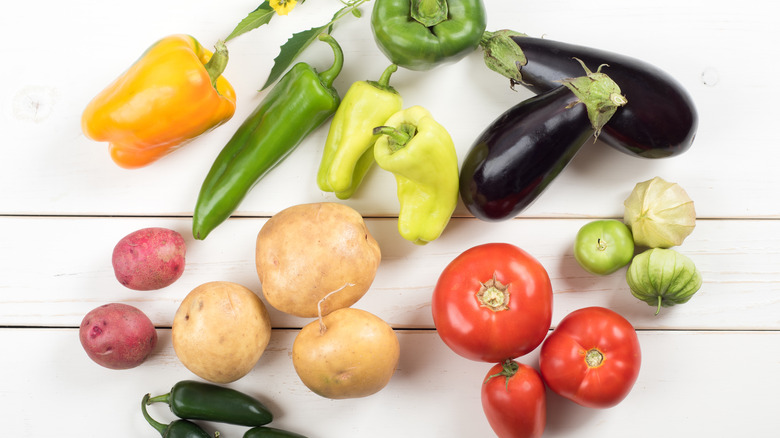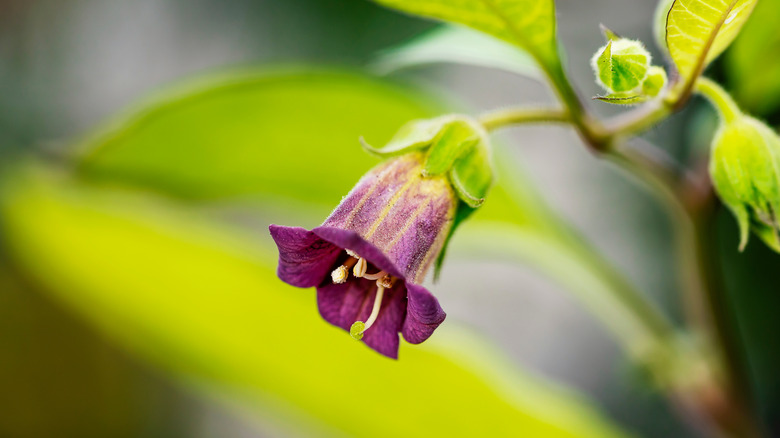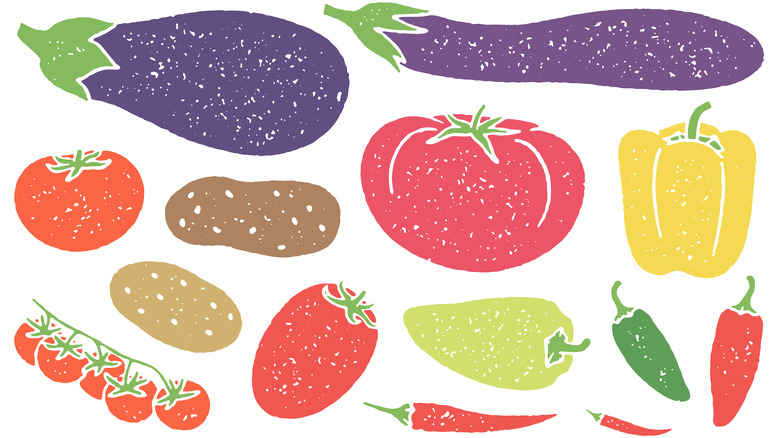The Nightshade Veggie Myth You Have To Stop Believing
Eating enough vegetables is an important part of a well-balanced diet. Unfortunately, for veggies of the nightshade variety, there is one common misconception that could be preventing people from enjoying them. Some dietary plans even suggest eliminating these vegetables altogether, due to the rumor that these veggies are harmful.
This mostly false accusation stems from the idea that any plants in the nightshade family may be too closely associated with Atropa belladonna, also called "deadly nightshade." That dangerous plant, when its leaves or berries are eaten, could lead to death in the most severe cases — as documented by the Turkish Journal of Anaesthesiology and Reanimation — or hallucinations and lethargy in milder ones. The plant is even rumored to be what killed Roman Emperor Augustus.
Fortunately, for those looking to expand their intake of vegetables, the commonly eaten nightshade veggies are almost completely safe to consume, despite the name-based association with the deadly plant — and they can even be a great tool for gaining some extra nutrients.
Is there any risk of toxins?
Although such vegetables are nearly always safe, they do technically belong to the same family as deadly nightshade, known as the Solanaceae family. Some of the more favorable plants in this group include bell peppers, eggplants, tomatoes, and potatoes — pretty commonplace ingredients in most kitchens. More dangerous plants from this family include the aforementioned Atropa belladonna as well as tobacco and mandrake.
Many plants in the Solanaceae family contain alkaloids, which can have toxic effects when ingested, per Plant Toxins. Fortunately, these alkaloids are largely absent from nightshade vegetables. The biggest cause for concern is raw, green potatoes, which can develop the alkaloid known as solanine. In large quantities, solanine can be dangerous to consume, according to Michigan State University, and can cause symptoms similar to those associated with food poisoning. To prevent any risks, you'll want to make sure that your spuds are the correct color before cooking them up.
Eggplants can also contain trace amounts of solanine, but the quantities are low enough that they won't generally have an effect on those who eat them (via Medical News Today). Thankfully, most other vegetables in this family do not produce significant levels of solanine — and sometimes, none at all.
These vegetables are actually good for you
Not only are the nightshade veggies typically free from dangerous toxins — they actually hold quite a few different health benefits and could help to improve your overall wellbeing. For example, the purple color of eggplants comes from the antioxidant known as anthocyanin, which WebMD notes has also been found to help prevent cancer and diabetes.
If you want to double down on cancer-prevention, reach for some extra tomatoes on top of your salads – they contain lycopene, which may help prevent lung, bone, and prostate cancers. Bell peppers are a good source of iron, and the vitamin C present in them can help with iron absorption to prevent anemia, says Healthline.
Overall, the proven benefits of these veggies should be trusted over any unfounded myths. Don't be afraid to add some more nightshade vegetables into your diet. You can even combine eggplant, tomato, and bell peppers into one dish by cooking up some hearty eggplant parmesan for a delicious dinner.


